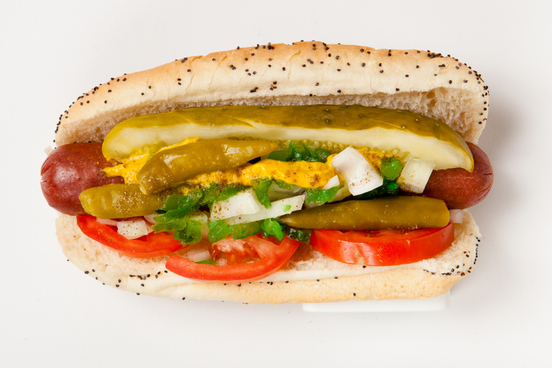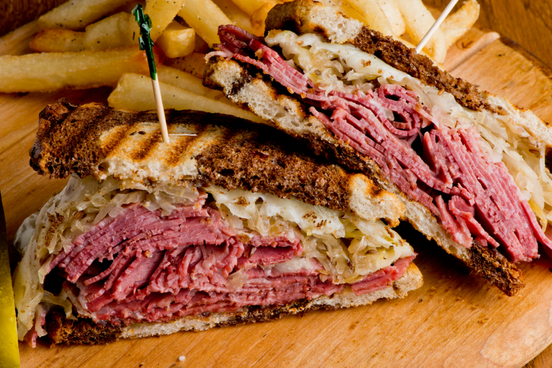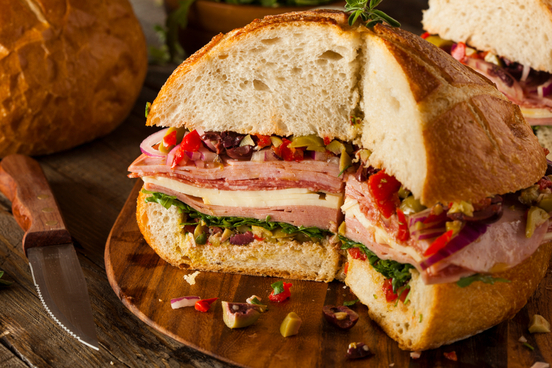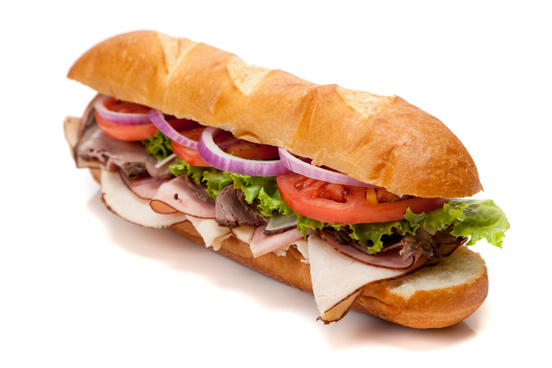
Sandwich
Definition:
1) two or more slices of bread or a split roll having a filling in between
2) one slice of bread covered with food
A list about sandwiches should start with the story of the sandwich itself. It's a humble, unassuming category of cuisine, and its purported origins are pragmatic. The 4th Earl of Sandwich, one John Montagu, was an 18th century English politician and military man who, according to lore, also liked to gamble. And gamble. And gamble. Legend has it that during one particularly compelling gambling session he spent 24 hours at a gaming table, ordering slices of cold beef between pieces of toast to sustain him. Whether the Earl left the table ahead or behind has been lost to history, but the comestible that got him through bears his name and makes an appearance in untold numbers of lunches around the world.

Hot Dog
Definition: frankfurter; especially : a frankfurter heated and served in a long split roll
The word hot dog refers either to the sausage that you buy squeezed in a plastic package with 7 or so of its kind, or to the same sausage heated and served in a long split roll.
When it's served in the roll, it's also a sandwich.
We know: the idea that a hot dog is a sandwich is heresy to some of you. But given that the definition of sandwich is "two or more slices of bread or a split roll having a filling in between," there is no sensible way around it. If you want a meatball sandwich on a split roll to be a kind of sandwich, then you have to accept that a hot dog is also a kind of sandwich.
You could hinge your anti-hot-dog-as-sandwich argument on whether the hot dog sausage qualifies as a "filling," but if you choose to interpret filling narrowly as only "a food mixture used to fill pastry or sandwiches," rather than broadly as "something used to fill a cavity, container, or depression," then you're not going to allow any single-item filling to qualify a food item as a sandwich—which means there can be no thing as a peanut butter sandwich or a bologna (or even baloney) sandwich.
Hence, a hot dog is a sandwich.

Croque Monsieur
Definition: a ham and cheese sandwich that is usually dipped in batter and grilled
It's basically a glorified ham and cheese sandwich—if here we let "glorified" refer to the involvement of the glorious and eminently useful béchamel sauce, which is often the batter used. During preparation, a croque monsieur can be dipped in the béchamel, or the béchamel can be spooned or brushed onto the sandwich. And the whole mess can be grilled or fried or broiled.
If béchamel weren't enough, the glorification of the croque monsieur is further secured by its mention in Proust's À la recherche du temps perdu (In Search of Lost Time).
The sandwich and its name are French; croque monsieur translates as "(one) bites with a crunch (the) gentleman." A more colloquial gloss would be "snack gentleman." Croquer can mean "to crunch" and "to be crunchy," among other things.
To file in the "etymologies that probably aren't true" is this tale about the origin of the croque monsieur: a café owner who was also known to be a cannibal invented the croque monsieur (which was a distinct departure from the traditional ham-and-cheese on a baguette), and told customers it was "monsieur," playing on the joke about his own cannibalism.
Our earliest evidence of the word in use in English is from 1915.
There's a variation on the croque monsieur that doesn’t appear nearly so often on English language menus: the croque madame is a croque monsieur topped with a fried egg.

Reuben
Definition: a grilled sandwich of corned beef, Swiss cheese, and sauerkraut usually on rye bread
There are two commonly repeated stories of how the Reuben came to have its name. Each involves a man named Reuben and cabbage. One hinges on a hungry costar of Charlie Chaplin's in a New York restaurant, and the other involves a late-night snack during an Omaha poker game.
Merriam-Webster's etymology favors the one with the poker game: the Reuben probably gets its name from Reuben Kulakofsky, an American grocer. According to the lore, Kulakofsky's hunger during a poker game in the mid-late 1920s led either to him making the sandwich now known as a Reuben, or to him requesting a sandwich with corned beef and sauerkraut, inspiring the chef of the restaurant hosting the poker game to create the famed sandwich. The granddaughter of that alleged chef recently recounted her family's version of the story in the New York Times, reporting that the original sandwich included corned beef, Swiss cheese, and sauerkraut mixed with Thousand Island dressing on dark rye, then grilled.
The other story traces the Reuben to the famous "Reuben's Restaurant" in New York City, and an actress named Annette Seelos, who was filming a movie with Charlie Chaplin at the time. Seelos was famished one night in 1914 and was given an improvised sandwich of ham, turkey, Swiss cheese, cole slaw, and Russian dressing on rye, which became an instant success.
The word "probably" in our etymology leaves open the possibility that evidence will emerge that tips the balance in favor of the Reuben's Restaurant origin, but based on the existing menu evidence, we consider the Omaha origin to be the more plausible at this time.

Slider
Definition: a very small meat sandwich typically served on a bun; especially : a small hamburger
Before a slider was a little hamburger (or a fancier bun-bound food involving salmon or foie gras or something even harder to pronounce) the word referred to a kind of ice cream sandwich. That sense dates to at least 1915 and appears to have mostly been used on the European side of the Atlantic.
The White Castle restaurant chain, which served its first 2-inch square hamburger in 1921, may well have been serving what we now call sliders longer than anyone else, but it's not clear when the word slider was first attached to the White Castle burgers themselves. It's at least as early as 1982:
In Chicago, White Castle burgers are called ''whitey one-bites.'' St. Louisans call them ''belly bombers'' or ''sliders.''
— Tim Bryant, United Press International, 1 June 1982
Though White Castle may lay claim to what most people think of as the original slider, the word slider was used to refer to a hamburger not associated with White Castle as early as 1974.

Sandwich Generation
Definition: a generation of people who are caring for their aging parents while supporting their own children
WAIT, you say. This isn't a sandwich at all, you say.
To which we reply: you're right. Consider this one a palate cleanser.
This term, which dates to at least 1975, employs sandwich metaphorically: the word can also refer to two similar objects that enclose a different one. A sandwich generation is pressed between obligations.

Muffuletta
Definition: a sandwich made with round Italian bread and filled usually with cold cuts, cheese, and olive salad
You can spell it with two u's, as above, or with two a's: muffaletta.
The invention of the muffuletta is widely credited to the Sicilian-born proprietor of New Orleans' Central Grocery, Salvatore Lupo. While the sandwich is said to have been created just after the turn of the 20th century, evidence of the word muffuletta in print dates only to 1967.
The sandwich's name is probably from Italian dialect. The word's origins likely include the Italian word muffoletta meaning "little muff," that word itself being a diminutive of muffola, "muff," from the French moufle, meaning "mitten."

Western Sandwich
Definition: a sandwich filled with a western omelet
It's breakfast. No, it's lunch. No, wait: it's dinner! You can serve it whenever you want, in fact. Just make a western omelet (also called a Denver omelet), which typically has diced ham, green pepper, and onion in it, and put it between two pieces of toast.
The term western sandwich dates to the early 20th century. The earliest known evidence of its alternate name, Denver sandwich, is from 1925.
According to Alice McLean's Cooking in America, 1840-1945 (which cites a 1924 cookbook by one Ida Bailey Allen), the western sandwich was likely "invented by pioneer women or by chuckwagon cooks" in the frontier days. Others, among them cookbook author James Beard, date the sandwich to the same locale, but claim that the sandwich is the innovation of 19th or early 20th century Chinese cooks who created it as a variation on egg foo yong while preparing food for the loggers and railroad workers.

Submarine
Definition: a large sandwich on a long split roll with any of a variety of fillings (such as meatballs or cold cuts, cheese, lettuce, and tomato)
We define it under submarine, but you may very well call it something else—perhaps the truncated sub; or the similarly shape-based torpedo; or the mechanical-sounding (or toothy) grinder; or the mask-and-cape-evoking hero; or the Philadelphian hoagie; or the Continental Italian sandwich, or the pauperish po'boy, or something else entirely. This classic sandwich, which comes in a near-infinite number of varieties, changes its name depending on its locale. Bon Appetit published an article digging into a number of these names.

Sloppy Joe
Definition: ground beef cooked in a thick spicy sauce and usually served on a bun
Though the identity of whatever (if any) Joe the sandwiches were named for has been lost in obscurity, the sandwiches are indeed sloppy: though we are unaware of any scientific studies estimating the percentage of filling that typically slides out of the bun to land on the plate during the course of eating a sloppy joe, we feel confident in asserting that the amount is universally significant.
The earliest known mention of this challenging but beloved sandwich is from an ad in the Mansfield (Ohio) News Journal, from March 27, 1940. The ad lists items available at a joint called Hamilton's, and includes sloppy joes among the offerings. This use predates another use of the term by only two years: as early as 1942, Sloppy Joe (typically capitalized) referred to a loose-fitting sweater. Sloppy Joe has also been used over the years to refer to what might be thought of as the antithesis of the metrosexual: "a man who is negligent of his clothes or personal appearance," as Merriam-Webster Unabridged puts it.





